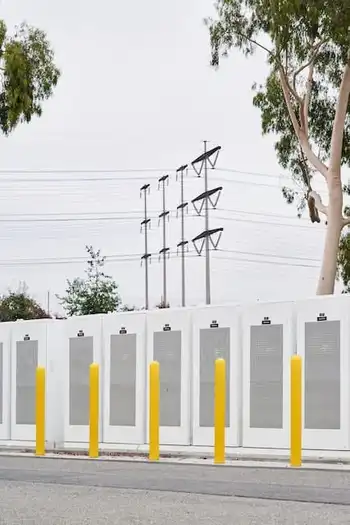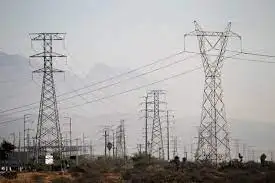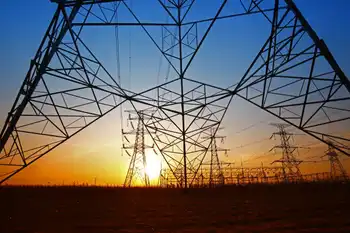Bill calls for federal oversight of TVA
By Knoxville News Sentinel
Arc Flash Training - CSA Z462 Electrical Safety
Our customized live online or in‑person group training can be delivered to your staff at your location.

- Live Online
- 6 hours Instructor-led
- Group Training Available
Over the decades, the New Deal agency has gone from a massive public works project to the nation's largest utility - with a nonpower mandate supported by taxpayers - to a self-funded agency with manifold missions.
Once run by a powerful triumvirate that both set and implemented policy, TVA now mimics a private company with a nine-person board to set policy and a chief executive officer to run the show.
It looks more like a private company than ever before, but it's not regulated like a private company. Nobody can poach on its turf.
In a bill introduced last year, Sen. Jim Bunning, a Kentucky Republican, called for oversight by the Federal Energy Regulatory Commission that would result in competition for distributors.
Also imbedded in the bill is a provision that calls on the Government Accountability Office to study whether the utility should be privatized.
"With all the issues of a major generation and transmission company, it seems only fair that TVA receive the same federal regulation as other utilities," Bunning said. "These regulations, for example, ensure fair access to distribution networks, which was initially denied to five of our Kentucky companies who tried to leave TVA."
Tennessee's senators - Republicans Lamar Alexander and Bob Corker - oppose the measure.
"The Bunning bill is a solution to a problem that doesn't exist," Corker said. "I think we've got something that's working for us today."
Corker and Bunning serve on the Senate's Energy and Natural Resources Committee, where the measure is languishing and, according to both lawmakers, not likely to emerge anytime soon.
But Bunning warned the issues raised in the bill - an opportunity for investor-owned utilities to compete for customers with TVA and the possible privatization of an agency that primarily does what private companies do in other regions - could return as TVA moves into the future.
When Democratic President Franklin D. Roosevelt pushed through the legislation that created TVA in 1933, the Tennessee River was shallow, untamed and prone to destructive flooding. Many areas of the valley were innocent of electricity. In the throes of the Great Depression, poverty was prevalent.
TVA raised the ire of river-bottom farmers and others by removing them from their land. But the utility brought in jobs - thousands of construction workers built dams and steam plants across the region during the agency's lifetime. The federal government basically built a fence around TVA. The agency had the exclusive rights to power production through the area it served.
Electricity crackled through the valley. The Tennessee River was forced into a state of perpetual but managed flooding. TVA began work on Norris Dam in 1933 and completed the controversial Tellico Dam in 1979. In 1967, TVA began building the Browns Ferry Nuclear Plant, the beginning of an ambitious nuclear construction program.
But there were problems. Construction costs for the nuclear plants soared, and the agency's debt mushroomed. TVA started, but never completed, several reactors and an experimental breeder reactor. Environmentalists nearly halted the construction of Tellico Dam in an effort to save the endangered snail darter. Under enormous regulatory pressure, TVA started upgrading its coal-fired plants to reduce pollution.
In 1959, Congress made the first of three major changes to TVA's operations when it voted to force the utility to fund its energy production through power sales. Only the agency's nonpower programs - its land management and economic development missions, for example - would be funded by taxpayers.
That wasn't enough for some utilities, however. In the 1990s, TVA's investor-owned neighbors like Charlotte-based Duke Energy Corp. and the Atlanta-based Southern Co. formed a group called TVA Watch to pressure Congress to level the playing field. The group focused on forcing TVA to become completely self-funded by paying for its nonpower programs with energy revenues instead of tax dollars.
They succeeded in 1997.
The most recent change occurred in 2005, when TVA tossed out its old command structure. Instead of a three-person panel that both set policy and ran the agency, the change calls for TVA's leadership to mirror a private company's. A nine-person, part-time board sets policy and a CEO directs operations.
Corker sees the board structure as the key to TVA's survival in the 21st century.
"TVA, to me, has greatly professionalized its structure and has continued to be a low-cost provider to the valley," Corker said. "I see no reason for changes at this time. My sense is, TVA will continue to evolve in a positive way. If it doesn't, there may be a reason for revisiting it."
Bunning's bill, introduced in March 2007, calls for the Federal Energy Regulatory Commission to treat TVA just like a private company. That means other companies would be allowed to compete with TVA for customers.
Corker countered that TVA is a good fit for its customers.
"Not only is itÂ… a low-cost provider of energy, it has an environmental mission," he said. "It has an economic development mission."
Alexander has been critical of TVA's reliance on coal and has railed against air pollution from power plants. But when it comes to the agency's overall mission he's a staunch ally in the halls of the Capitol.
He noted TVA's evolution while insisting that competition and privatization aren't the answers.
"I've been looking very hard to look for a place anywhere in the country that electric rates went down as a result of deregulation," he said. "As far as I can tell, all it's led to is higher prices."
A natural ally for Bunning would be the private companies that could compete with TVA. But the Southern Co., for one, seems content to leave the TVA Watch hatchet buried.
"We congratulate TVA on their 75th anniversary," said Mike Tyndall, a company spokesman who added his firm gets along well with its neighbor.
"In the past, there was a period of time we were concerned that TVA might try to cross the fence that separates the two companies and compete with subsidized power," Tyndall said. "We worked through that 10 years ago."
Tyndall declined to comment on the issues raised by Bunning's bill.
Bunning's bill also would order the U.S. Government Accountability Office to study possibly privatizing the agency.
"The privatization study was requested to update the government's position in the TVA," Bunning said. "As the TVA has amassed around $25 billion in debtÂ… the federal taxpayers may have liability if TVA were to be unable to pay its debt. A full study of privatization would provide an independent analysis of the financial exposure of the taxpayer and seems like a prudent step to understand what possibilities the country would have if privatization is ever necessary."
Alexander countered that as a government agency, TVA can take on projects that private, investor-owned utilities can't. He held up a recent government contract to study ways to store nuclear waste from power plants as an example.
Alexander said that though many of TVA's nonpower objectives like flood control and economic parity with the rest of the country have been achieved, more remains.
"The new challenges are just as big as the old challenges," Alexander said.
Combating global warming is one such challenge, he said, adding that nuclear plants don't produce greenhouse gases. TVA is reviving its mothballed nuclear construction program.
Reducing the country's dependence on foreign oil, he said, is another area where TVA can help. Some generating plants now idle during low-demand nighttime hours could be used to generate power for plug-in electric cars, Alexander said.
While Alexander focuses on new initiatives, Corker emphasizes leadership when discussing the agency's future course.
"My biggest fear is the day a president does not take nominations to the TVA board seriously," Corker said.
Alexander said the agency would do well not to forget the key reason for its existence.
"I think its basic role is unchanged and it should focus on its core role, which is to produce large amounts of clean electricity at a low cost," he said. "That's its central mission, and if it does that, everything else will fall into place."
Power production - and its cost - is the current that runs through many discussions of TVA's future.
It was a dispute between five Kentucky distributors and TVA over pricing that prompted Bunning to act. The agency and the distributors have since resolved their differences, and Bunning has put the bill on hold.
It could be resurrected, however, he said.
"For now I'm not actively pushing the legislation," Bunning said, "but if the customers in Kentucky feel like they are not treated fairly again, I will try to move this legislation through Congress as quickly as I can."















